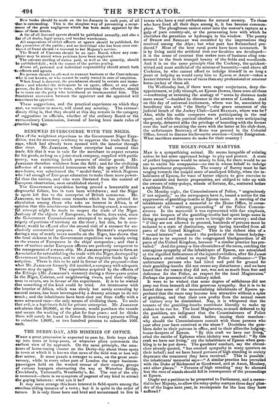THE DERBY-DAY, AND MISERIES OF OFFICE.
WHEN a great procession is expected to pass by, little boys climb Up into trees or lamp-posts, or whatever place commands the earliest view of its approach. On the same principle, the ama- teurs of horse-racing cluster on the Derby-day about those spots in town at which it is known that news of the field woo or lost will
• first arrive. It must puzzle a stranger to note, on the great anni- versary, while in every other part of London the eager business- passengers hold on the wonted tenour of their course, groups of curious loungers obstructing the way at Waterloo Bridge, .Croiliford's, Tattersall's, Weatherby's, Ste. The rest of the city is unmoved—there is no symptom of pageant of any kind to attract • first arrive. It must puzzle a stranger to note, on the great anni- versary, while in every other part of London the eager business- passengers hold on the wonted tenour of their course, groups of curious loungers obstructing the way at Waterloo Bridge, .Croiliford's, Tattersall's, Weatherby's, Ste. The rest of the city is unmoved—there is no symptom of pageant of any kind to attract • the gaping loiterers : what can it be?
It may seem strange this keen interest in field-sports among the omnibus-riding inmates of a town ; but it is quite in the order of nature. It is only those born and bred and accustomed to live in towns who have a real enthusiasm for natural scenery. To those who have lived all their days among it, it has become common- place. The ploughman cannot enter into the weaver's rapture at a gulp of pure country-air, or the persevering love with which he cherishes the geranium or hydrangia in his window. The poetry of Brims and SHELLEY was ennobled by the impressions they received among the Alps ; but what poet has Switzerland pro- duced? Most of the best rural poets have been townsmeh. It is by living amid the artificial that our faculties are developed— it is the sense of contrast that makes men of business cling ena- moured to the fresh tranquil beauty of the fields and woodlands. And it is on the same principle that the Cockney, the quickest- witted and most artificial of the minims of humanity—and above all Cocknies, he who cannot afford to indulge himself in so long a jaunt or holyday as would carry him to Epsom or Ascot—takes a keener interest in the news of races than any professional or amateur horse-jockey of them all.
On Wednesday last, if there were eager conjectures, deep dis- appointment, or jolly triumph, on Epsom Downs, there were all these —confirming or reversing the analogy of "notes by distance made more sweet"—doubled by distance in the streets of London. And on this day of universal excitement, where was he, associated by hereditary ties with "the Derby "—the grave ornament of the judicial bench of the Jockey Club—Lord STANLEY, where was he? Alas, while his noble compeers were participating in the real sport, and while the poetical idealists of London were anticipating the gossip, debarred alike the privilege of bounding with the former over the turf or awaiting the news with the latter at his club-door, the unfortunate Secretary of State was penned in the Colonial Office, forced to discuss his favourite aversion—Coolie Emigration. What sacrifices statesmen do make for their country 1


























 Previous page
Previous page